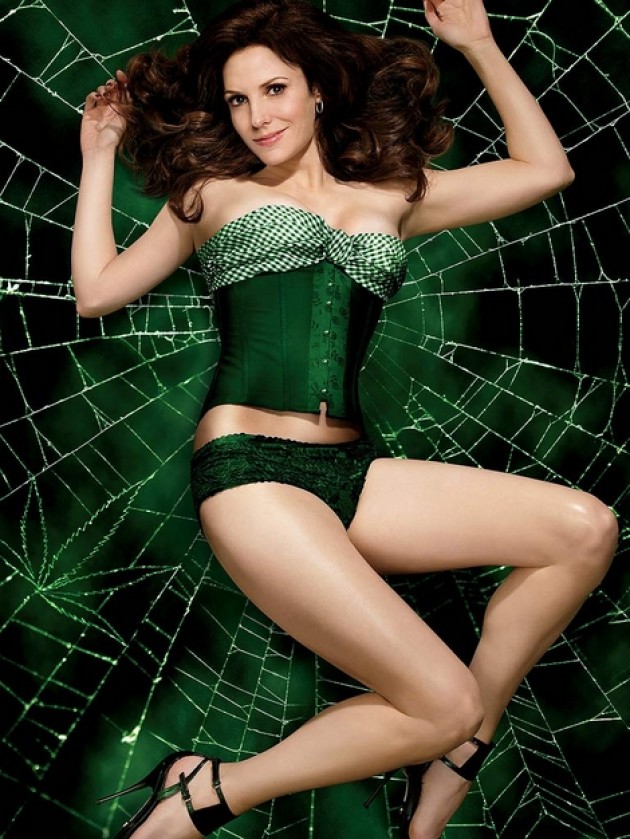I binge-watched several seasons of Weeds back there a while ago. The show got worse and worse and more and more improbable as it went along. Soccer-mom-turned-weed-dealer Nancy Botwin (Mary Louise-Parker) becomes stupider, more repulsive, and less believable as the plot spins along pointlessly yet eventfully, as serial plots will do. Eventually Nancy ends up moving out to Texas and the Mexican border, where she owns a little boutique as a front for hard drug dealers (hard drugs are bad, in case you didn’t know) who use the store as one end of a smuggling tunnel.
The problem is that running the store makes Nancy bored, despite the fact that she’s now wealthy and has enough money to take care of her family and could presumably take up a hobby like golf or sleeping with various guys (which the show presents as her main interest) or whatever.
But again, plot must keep plotting, so Nancy goes exploring where she shouldn’t (shades of Bluebeard) and ends up seeing, coming through the tunnel, not hard drugs, but…a woman.
Again, I watched this a while ago, and I’m not watching it again, but as I remember the image of the (Latina) woman is shot in semi-slow motion, like a dream image. Nancy is transfixed with something (horror, presumably, though desire is a buried possibility) — and then the woman is gone, taken away, we know not where. Later, Nancy has a kind of moral epiphany related to the woman; she realizes that her work with the drug cartel is horrible and wrong, and that she (Nancy) is a bad person and needs to change. End of moral — and of the series, for me. That was the last episode I watched.
I wasn’t at the time entirely sure why Nancy’s slow-mo longing for the woman in the tunnel was so repulsive. But I’ve done more reading about sex-trafficking since, and that’s clarified the problem. In sex-trafficking narratives (of which this is one) women who cross borders are seen as helpless, debased victims, in the thrall of villains who ruthlessly exploit them. It’s a sensational story — and, as Laura Agostín and others have argued, it’s not necessarily especially anchored in reality. Instead, sex trafficking often serves as an exploitation narrative, providing exciting thrills for folks at home while giving useful cover for government anti-immigration raids.
In this context, it seems important to point out that Nancy never talks to the distant marginal woman. She doesn’t ask her if she’s in distress, or if she needs help. How exactly does she know that the woman doesn’t want to come into the United States? There are, after all, many folks who do want to immigrate from Mexico to the U.S.; it seems like a pretty big leap to assume that someone crossing the border is a kidnapping victim rather than an immigrant under her own power. Unless, of course, you assume all non-white women are automatically debased victims.
That does seem to be how Weeds sees this unnamed and unspeaking icon, whose function is to remain silent so that she can fit neatly into Nancy’s psychodrama. She is a mute object lesson; we don’t care about who she is, but only about how Nancy feels about who she is. The dispossessed, victimized other is valuable as an exercise in empathetic response for the middle-class white woman — to show how privileged and awful she is, and teach her to do better.
Kohan went on to make Orange Is the New Black, of course, a show in which non-white women do, mercifully, get to talk. Still, Kohan hasn’t changed that much. I’ve written a bunch about why I don’t like OITNB, but I think this incident from Weeds sums up the trouble economically. That trouble is carelessness — both in the sense that Kohan has not taken the time to learn about the Very Important Issues she addresses, and in the sense that she doesn’t seem to actually care about them, except as they fit into her sit-com engine of alternating cutesiness and moral epiphanies. Her glibness is so overwhelming it is virtually indistinguishable from cynicism, and her empathy so conveniently self-serving it might as well be solipsism. She is a master of empathysploitation, a longstanding genre whose popularity, it seems, never fades.


The trafficking issue seems pretty complicated, and I thought Chester Brown oversimplified it from the opposite side in his prostitution book. Chester’s take on it was that most women trafficked to North America as prostitutes WANT to be trafficked here in order to better their lives. Therefore, it was perfectly okay for him to sleep with brothel prostitutes who didn’t speak English and were probably in Canada illegally. I agree that those women probably weren’t being forced at gunpoint to have sex with Chester, but still, it sounds like they were at the mercy of the brothel owners and in a semi-coercive situation.
Yeah…it’s definitely complicated. In both Brown and Weeds, I’d say the problem is that sex trafficking seems like it gets interpreted or seen almost entirely in terms of how other folks see it, or care about it. You don’t really get the voices of the women themselves; or much of a sense that the voices of the women themselves might be valuable or important to think about.
I am amazed you got that far. I got as far as when the town burns down, but by then I had been ready to give up for a while – so that seemed as good a spot as any.